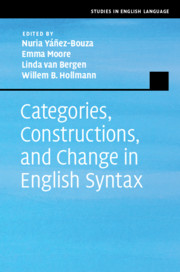The occurrence of the Old English negative particle ne ‘not’ preceding a bare infinitive rather than a finite verb is a largely neglected or overlooked phenomenon. It is attested in constructions with uton ‘let's’ and in conjoined clauses with omission of the finite verb (Mitchell 1985). This article discusses evidence gathered mainly from the York–Toronto–Helsinki Parsed Corpus of Old English Prose, showing that it is a phenomenon that needs to be taken seriously in descriptions and analyses of Old English. It is argued that the factor shared by the two constructions is the lack of an available finite verb for ne to attach to. It is also found that the use of ne for the purpose of negative concord appears to be more variable with infinitives than it is with finite verbs. Whether attachment of ne to a non-finite verb in the absence of a finite one is restricted to bare infinitives is difficult to determine because of the limited evidence relating to other non-finite forms, but there are some indications that use of ne may have been possible with present participles. Finally, some implications that the ne + infinitive pattern has for the formal analysis of Old English are discussed.
